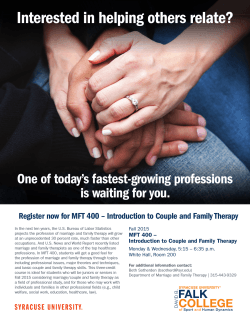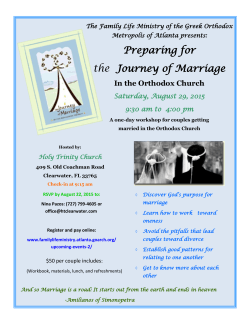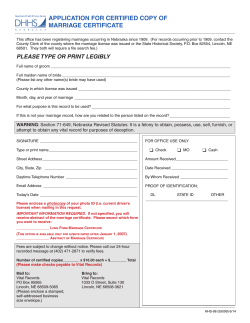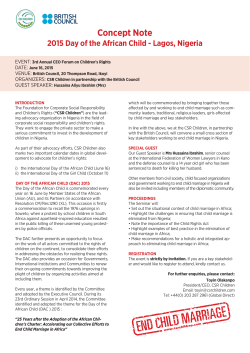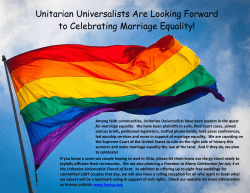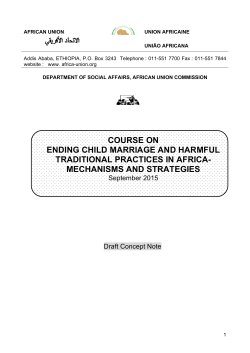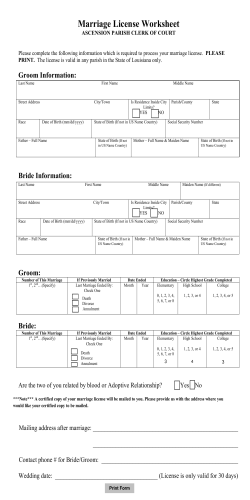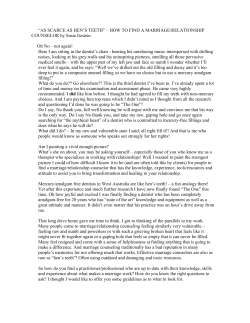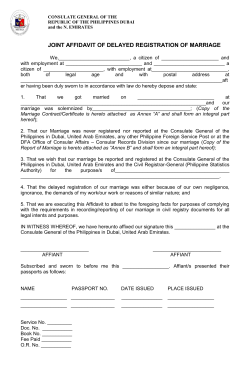
Concept Note - African Union Pages
AFRICAN UNION UNION AFRICAINE UNIÃO AFRICANA Addis Ababa, ETHIOPIA P. O. Box 3243 Tele: +251-11-5517 700 Website: www.au.int Fax: +251-11-5517844 DRAFT CONCEPT NOTE African Girl’s Summit on Ending Child Marriage in Africa 27 – 28 November 2015 Niamey, Niger 1. INTRODUCTION Child marriage is a human rights violation that robs girls of their rights to health, to live in security, and to choose if, when and whom to marry. It is a harmful practice which severely affects the rights of a child and further deprives the child from attaining other aspirations like education. Every year, about 14 million adolescent and teen girls are married, almost always forced into the arrangement by their parents. Although the proportion of child brides has generally decreased over the last 30 years, in some regions child marriage remains common, even among the youngest generations, particularly in rural areas and among the poorest. Among young women worldwide aged 20-24, around 1 in 3 (or 70 million) was married as children and around 1 in 9 (or 23 million) entered into marriage or union before they reached age 15. The largest numbers of child brides are concentrated in Africa. In Africa, the highest prevalence of child marriage (Child marriage prevalence is defined as the percentage of women 20-24 years old who were married or in union before age 18) is dominant in at least 19 countries.i Despite most African countries setting the legal age for marriage at 18 years, laws are rarely enforced since the practice of marrying young children is upheld by tradition and social norms. Child marriage is deeply rooted in gender inequality (gender based violence and gender discrimination), poverty, tradition and culture. The practice is most common in rural areas, where prospects for girls can be limited. In many cases, parents arrange these marriages and young girls have no choice. Consequently, some societies believe that early marriage will protect young girls from sexual attacks and violence and see it as a way to insure that, their daughters will not become pregnant out of wedlock and bring dishonour to the family. In effect, the paradox is that parents and society are often wrong. Girls and women have the right to live free from violence and discrimination and achieve their potential but are prevented due to being forced into child marriage and this harmful practice has devastating effects on the girl-child and the society, one of the leading causes of maternal mortality and morbidity for girls age 15 to 19 is pregnancy and childbirth. As we look at the developmental impact of child marriage on the community and Africa, we should bear in mind that, it is a serious violation of human rights. Child marriage as a human rights violation has been included in a number of legal instruments at the continental and international levels. The African Union (AU) specifically promotes policies related to young peoples’ rights and is mandated by its various legal instruments ( more recently, 5th Strategic Priority of AU’s Strategic Plan 2014 –2017 as well as AU’s Agenda 2063) with a bearing on the rights of children and youth to promote common standards by supporting adaptation and implementation of the instruments at regional and national level and monitoring of implementation progress by Member States and ensuring accountability. In an effort to provide a bright future for millions of women and girls, the AU together with a range of partners launched the African Union Campaign to End Child Marriage in Africa on 29 May 2014. The campaign is focused on accelerating change across the continent by encouraging African governments to develop strategies to raise awareness of and address the harmful impact of child marriage as well as expediting and invigorating the movement to end child marriage by: (i) supporting policy action in the protection and promotion of human rights, especially with a view to addressing violence against girls and women and promoting gender equitable social norms (ii) mobilizing continental awareness of and engagement to end child marriage and (iii) removing barriers and bottlenecks to law enforcement. III. OBJECTIVES OF THE MEETING: In recognition of the efforts being made by African Governments and other stakeholders who have been actively working to discourage the practice by raising awareness of the adverse consequences for girls, running programs that provide girls with viable alternatives to marriage, and working towards more effective enforcement of existing laws that condemn child marriage; the African Union Commission in collaboration with the Government of the Republic of Niger are planning a two days high level meeting from 24 – 25 November 2015. The meeting will bring together high level personalities from Member StatesFirst Ladies, high level UN dignitaries, women and girls, civil society organizations including community and religious leaders and other stakeholders to: • Share experiences particularly countries that have already launched the AUC Campaign - good practices and challenges on ending child marriage at country, regional and international levels; • Secure and/or renew commitments from stakeholders particularly governments to invest more in order to accelerate an end to child marriage; • Interactive discussions of successes and challenges from community leaders, traditional, religious leaders, girls affected by child marriage and youth advocating against child marriage IV. EXPECTED OUTCOME OF MEETING: The expected outcomes will be: • • Enhance continental awareness of the effects of child marriage The end of child marriage in Africa accelerated V. VENUE OF THE MEETING AND PARTICIPANTS: The meeting will be organized by the AU Commission; the meeting will be attended by Member States- Ministers of dealing with social development-children’s affairs, Ministers of Finance, Religious and Community Leaders, youth advocates particularly women and girls affected by child marriage; Development Partners, UN Agencies, Bilateral and Multi-lateral Agencies and CSOs. The Meeting will be held over two days from 27 – 28 November 2015, in Niamey Niger as the host country. VI. COSTS All costs for the meeting will all be covered by the African Union Commission and supporting partners. VII. DOCUMENTATION: Working documents: TBD VIII. WORKING LANGUAGES Simultaneous interpretation will be available in the four AU working languages and working documents also will be in the four AU working languages. IX. CONTACT For further information, please contact: Amb. Olawale Maiyegun, Director, Dept. of Social Affairs, African Union Commission P O Box 3243, Addis Ababa, Ethiopia Tel: +251 115 51 77 00/ Ext 2210 Email: MaiyegunO@africa-union.org and CC: StrijdomJ@africa-union.org and ThunduN@africa-union.org i Niger (75%); Chad (68%); Central African Republic (68%); Guinea (63%); Mozambique (56%); Mali (55%); Burkina Faso (52%); South Sudan (52%); Malawi (50%); Madagascar(48%); Eritrea (47%); Somalia (45%); Sierra Leone (44%); Zambia (42%); Ethiopia (41%) Source: UNICEF State of the World's Children, 2013 - data from UNICEF Multiple Indicator Cluster Surveys (MICS), Demographic and Health Surveys (DHS)
© Copyright 2025


